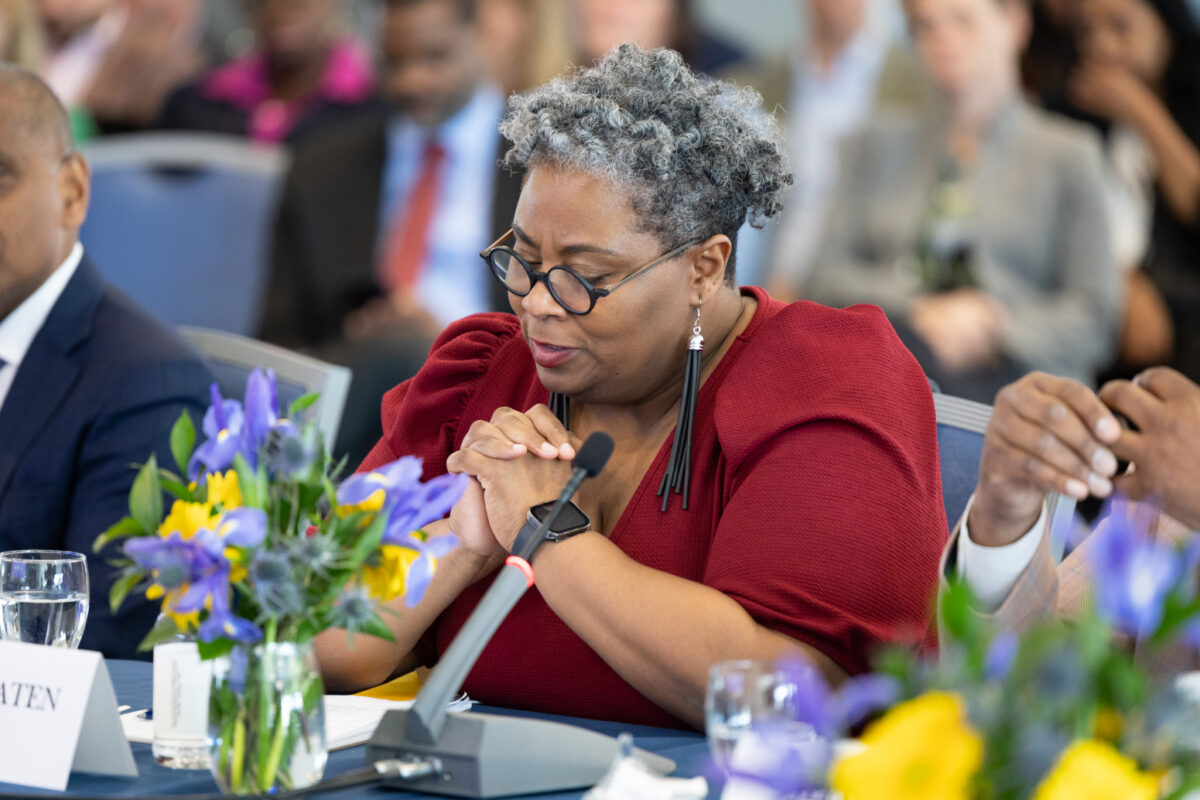That energy was most recently demonstrated during a roundtable discussion on the region’s tech hub designation at Coppin State University (CSU) on Monday. The HBCU’s president Anthony L. Jenkins kicked off the Greater Baltimore Committee’s (GBC) event by welcoming dignitaries and leaders in Maryland’s public and private sector to CSU’s sprawling 38-acre campus along North Avenue in West Baltimore.
Those assembled included members of the now-48-strong coalition of Baltimore’s corporations and institutions behind this bid. The coordinated effort mirrors others in Philadelphia, Richmond and other cities vying for millions in federal funding through the EDA’s Tech Hubs program. Part of the CHIPS and Science Act of 2022, the program aims to boost various US regions (including those that, like Charm City, still reel from divestment and deindustrialization) into innovation centers capable of competing on the global stage.
Baltimore, like the other 31 hubs named during the program’s first phase, is now awaiting decisions on what amount of funding the hub can get. By this summer, a decision is anticipated on Baltimore’s Phase 2 application, through which the EDA may distribute about $50-75 million in implementation grants to between five and 10 designated tech hubs.
At the Monday event, bid leaders and supporters discussed prospective plans for the $70 million in the GBC’s application.
Attendees included private sector partners like LaToya Staten of Fearless, Jeff Cherry of Conscious Venture Partners and Kory Bailey of UpSurge Baltimore; elected officials such as US Senators Ben Cardin and Chris Van Hollen, and Maryland Lt. Gov. Aruna Miller; and supporters like the staff of Enoch Pratt Free Library and its interim CEO Darcell Graham. Lt. Gov. Miller specifically addressed her and Gov. Wes Moore’s plans to back this bid.
“The Moore-Miller administration is firmly committed to supporting the game-changing Tech Hub designation,” she said before leaving for an MTA Maryland event. “Our administration looks forward to continuing to work with our federal and state partners and our local communities to build and support the region’s tech economy, make Maryland more competitive, and do so with a focus on equity and inclusion.”

LaToya Staten. (Courtesy Coppin State University)
During the roundtable, Sen. Van Hollen underscored the importance of HBCUs like CSU and Morgan State University in advancing both state and national interests. He referenced past achievements, including CSU’s prior investments in internet access, as well as the CHIPS and Science Act’s importance to preserving the US’ global leadership.
Sen. Cardin similarly noted Maryland’s leadership in healthcare equity, and the potential to be a national example, in a post-roundtable interview with Technical.ly.
“Maryland is a model [on] healthcare issues,” said Sen. Cardin, who highlighted the existing healthcare initiatives of local university systems.
He also cited the continued need for a genuine commitment to engaging underserved communities not often included in state and federal programs — particularly through partnerships with HBCUs.
“What I would like to see come out of here is that we have a real commitment to the untapped communities, the underserved communities, to get their input as we look at innovation on tech hubs, as we look for workforce development, healthcare equities and how we engage the HBCUs,” he said.
The consortium’s plans won’t end with the promise of federal funds, though. GBC CEO Mark Anthony Thomas said that the work done so far by the group would proceed irrespective of funding.
“We’re ready to move forward regardless of how this lands,” said Thomas. “But we feel good about where we are.”
Here’s how Baltimore plans to spend the money, as described by the consortium:
- Biomanufacturing Core: Addresses national security vulnerabilities created by insufficient US biomanufacturing capacity. Project partners will establish a state-of-the-art pilot biomanufacturing facility in Harford County, create a comprehensive Biomanufacturing Catalyst program and launch a groundbreaking Center for Community Impact in Manufacturing.
- The UpRise for Equitech: Creates a first-of-its-kind startup advancement network working with entrepreneur support organizations, building investor networks and strengthening procurement pathways.
- Anchor Innovation Hub: Connects, mobilizes and leverages the region’s physical and programmatic assets to help founders and early-stage entrepreneurs commercialize their innovations. Project partners will establish an intake and assistance program with case managers who will guide entrepreneurs and startups to apply for startup advisory and resourcing programs.
- The Baltimore Biotech Jobs Initiative: Creates a sustainable pipeline of future-ready workers who will form the backbone of America’s first Equitech region. Project partners will develop education and training pathways to meet biomanufacturing and life sciences demand while creating interconnected pathways for employers and developing support mechanisms for individuals pursuing biotech.
- Regional Innovation Office: Led by the Greater Baltimore Committee’s Regional Innovation Officer, this office will serve as a command center specifically organized to multiply innovation across all component projects with a “One Baltimore” approach: providing essential leadership and governance.”
Disclosure: This article mentions Fearless, a Technical.ly client. That relationship has no impact on this report.
Before you go...
Please consider supporting Technical.ly to keep our independent journalism strong. Unlike most business-focused media outlets, we don’t have a paywall. Instead, we count on your personal and organizational support.
Join our growing Slack community
Join 5,000 tech professionals and entrepreneurs in our community Slack today!

The person charged in the UnitedHealthcare CEO shooting had a ton of tech connections

From rejection to innovation: How I built a tool to beat AI hiring algorithms at their own game

Where are the country’s most vibrant tech and startup communities?



